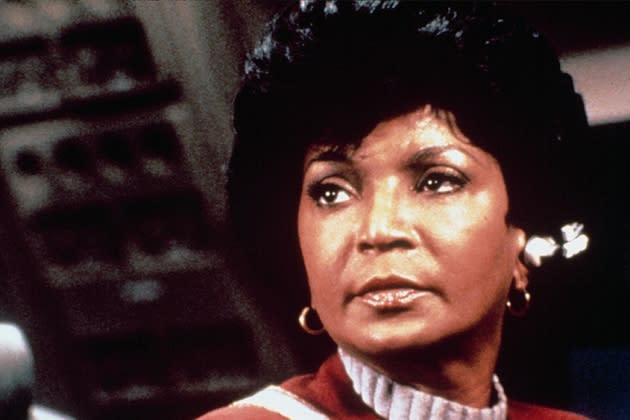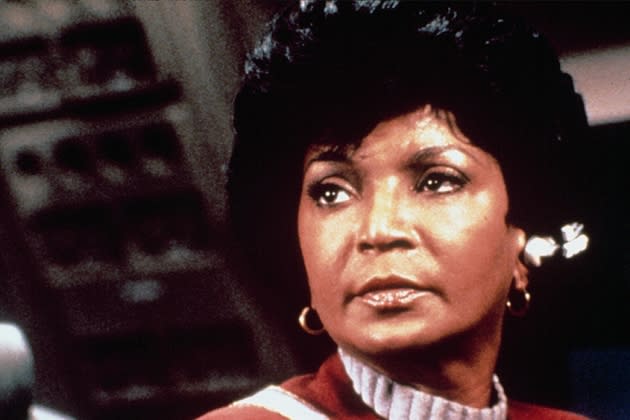
Nichelle Nichols, the trailblazing star of “Star Trek” who died on Saturday at age 89, was a model of unruffled professionalism as Lieutenant Uhura, never breaking a sweat as she manned the communications desk of the Starship Enterprise.
But for Nicholas Meyer, the director and screenwriter of “Star Trek II: The Wrath of Khan” and “Star Trek VI: The Undiscovered Country,” his favorite on-screen memory of Nichols’ is a rare moment where Uhura is at a loss for words. In the sixth installment, our heroes are trying to infiltrate Klingon airspace without the use of a universal translator, which would give them away. That leaves Uhura and the rest of the crew poring through Klingon dictionaries in a desperate attempt to hold up a conversation with the crew of another ship.
More from Variety
“Nichelle is just responding in the most appalling Klingon [dialect], and her face looks so pained and at one point one of them makes a joke in Klingon,” Meyer remembers. “She doesn’t understand, but gets that she’s supposed to find it amusing, so she just gives this hearty laugh and then abruptly cuts off the connection. It was just brilliant.”
Nichols broke barriers as one of the first Black women to have a major role on network television. And Nichols understood the impact that kind of representation had on audiences and used her celebrities to increase opportunities for others by working with NASA to recruit diverse astronauts.
Meyer, who spoke with Variety after news broke that Nichols had died, sees parallels between her work and that of Bill Russell, the NBA legend and Civil Rights advocate, who died on Sunday.
My experience with writing and directing “The Wrath of Khan” was chaotic in many ways. It was only the second movie I had ever directed, and I was relatively unfamiliar with the whole “Star Trek” world. What I thought was remarkable, not only about Nichelle, but about the whole cast, was how professional and courteous they were in welcoming a newcomer to that world and teaching me how it worked and how they worked together.
When “Star Trek” was a television series, they got used to the idea of different directors, different writers coming in for the various episodes, so they were professionally experienced. They were just amazingly helpful to me. And she was amazingly helpful. I was also writing the screenplay and she would say things like, “This isn’t exactly how Uhura would express herself here.” She would give me her version, and then I’d tweak it.
Nichelle told me to bear in mind that Uhura’s professionalism transcends her gender. This is a trained officer who is unflappable. She said, “If you listen to those NASA communications officers, all hell can be breaking loose, but they never betray that in how they talk. They remain calm.”
As for Nichelle, she was always professional and prompt. She knew her lines and she was not shy about making contributions. I remember she lectured me on “Wrath of Khan” and said, “Look, you’re saving my closeups for the end of the day. That is not the best time to shoot an actress.” What did I know? So we went back to the scene first thing in the morning.
Nichelle was multi-talented in that Leonard Bernstein way. Everything she touched she was good at. She could dance. She could sing. She could act. She was a natural born storyteller and was also fearlessly outspoken about things she thought were important, whether those were things that were important in the scene or cultural and political issues.
I think that encounter with Dr. King when he told her to stay on the show, because it was important to so many Black viewers, really opened a window for her and threw a light on what she was doing in ways that she hadn’t previously given much thought to. But once he made clear to her the good that could come of her being on “Star Trek,” she ran with that more or less for the rest of her life. She worked a lot with NASA and she knew exactly what she was doing and she was great at helping recruit for them.
When we worked together on “Star Trek VI,” it was a bittersweet experience because it was going to be the last film for the original cast, and they knew it. But it didn’t really impact anything until we filmed the last scene of the movie, which was on the last day of shooting. It had been psychologically built into the schedule that day. Well, nobody was happy. It was: “I don’t like this line or I don’t like that line. Can we try it again?” It wasn’t just Nichelle. Everybody was having ambivalent feelings. These people had interacted with one another over decades and had to make peace with the hand that fate had dealt them. The success of the show and the movies had paid for houses and kids’ braces, but it also had chained them together for eternity. They had complicated feelings about one another and other jobs that they might have wanted to do, but had to turn down or weren’t considered for. They were a family. They didn’t always get along. It could be fractious as families tend to be. But now it was time to say goodbye and saying goodbye is usually harder than anyone expects. There was a wrap party afterwards and usually those are unambiguous celebrations. This was quite complicated. No one knew what they should be feeling. It was something between a wedding and a wake.
When you say someone or something is great, you’re already implying some sort of uniqueness or specificity. God damn it, if great were common, we wouldn’t get so excited about it when it showed its face. Think about Bill Russell, who we are also memorializing right now. It’s the same thing. We’re talking about greatness and greatness is inimitable, just like Nichelle. And both Nichelle and Bill Russell were trailblazers. They were trailblazers in the face of the most appalling adversity, which we’d like to tell ourselves is a thing of the past, but we know is not.
I’ve met two kinds of people in my life — people who have profited from their experiences and people who have been embittered by them. Well, Nichelle was never embittered by what she had to deal with. She was enlarged from her experiences and the adversity she faced.
As told to Brent Lang.
Best of Variety
Sign up for Variety’s Newsletter. For the latest news, follow us on Facebook, Twitter, and Instagram.




